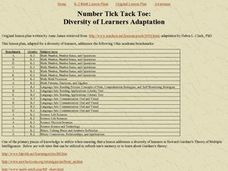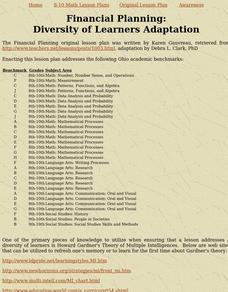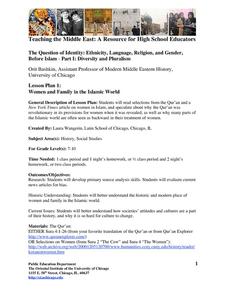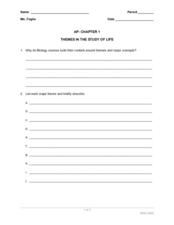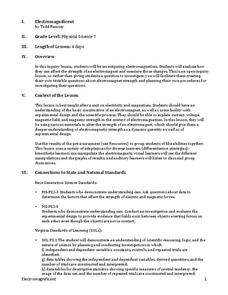Curated OER
You've Got to be Taught to Hate and Fear
Students explore themes of prejudice and acceptance. In this character education lesson, students listen and respond to several fiction books, poems, and lyrics with a similar theme. Students locate articles with the main idea of...
Curated OER
Native American Unit
Third graders explore America's history prior to 1492. This unit of six lessons identifies five regions of the United States and assists students in the development of an understanding of the Native Americans who lived in the regions.
Curated OER
I Belong, But Why Don't You?
Students explore discrimination. In this character development instructional activity, students identify groups and organizations to which they belong and the requirements that go with each group. Students discuss inclusion and exclusion...
Curated OER
Courage to Be You: King Day (7th)
Students define discrimination and relate it to their own experiences. In this discrimination lesson, students discuss feeling like a stranger and complete a personal experiences worksheet. Students then find strategies to reduce or...
Curated OER
The Middle East
Students (diversity of learners) explore The Middle East in a variety of ways. They cover a diverse section of concepts: geography, economics, research communications skills, both oral and visual. Students write reflections of their...
Curated OER
Number Tick Tack Toe
Students participate in activities that apply Howard Gardner's theory of Multiple Intelligences in order to improve literacy skills. The lesson is ideal for diverse learners because of the application of the theory.
Curated OER
Financial Planning
Students participate in activities in order to apply the skills of sound financial planning that includes creating and maintaining a budget. The lesson is intended for diverse learners because of the application of The Multiple...
Curated OER
Diversity And Adaptations Of Organisms
Seventh graders investigate how organisms respond to environmental stimuli through their behavior. They observe how plants and animals respond to varying amounts of light, water and gravity.
Curated OER
Facts, Fictions and Perceptions of Regions
Students examine the different characteristics of the regions of the United States. They discuss places they have visited in the U.S., and in small groups conduct research on a selected region of the U.S. Each group labels a map of...
Curated OER
Developing Thinking and Reasoning Skills in Primary Learners Using Detective Fiction
Students are introduced to the genre of detective fiction. Based on their reading level, they are given a different series of books to read. For each story, they are to make predictions and practice decoding messages. To end the...
Curated OER
Different! Diverse! Dynamic! Lesson 1: Late Bloomers
Students examine how people grow and mature at different rates. They create a graph and a timeline to organize the data they collect.
University of Chicago
Using Artifacts for Clues About Identity
Learn about the ancient Near East through a close examination of ancient artifacts. Lead your class into analysis by first observing an artifact as a class. Pupils can then work in pairs to analyze the other artifacts and compile a list...
University of Chicago
Women and Family in the Islamic World
How does the Qur'an detail the role of women? What modern social issues are linked to Islamic law? Address these questions with your young historians through close analysis of primary and secondary source documents.
Curated OER
Telling Our Stories of Giving - Writing to Persuade
After identifying the parts of a persuasive piece of writing, young writers explore different prewriting activities for the persuasive essay. They have the option to write a news article, personal narrative, or persuasive essay to...
University of Chicago
Addressing Stereotypes
How is a stereotype defined, and what are some mechanisms we can use to combat negative stereotyping? Your young historians will discuss how and why stereotyping occurs, as well as consider the roots of modern conceptions of...
Curated OER
Real-Life History: Looking at Our Community
Spend several days with your class exploring local history. Learners brainstorm and categorize sources of historical information as primary or secondary; collect and present artifacts from family/community; construct a definition of...
Curated OER
AP: Chapter 1: Themes in the Study of Life
Life science learners list and describe 10 major themes that biology courses are built around. They are introduced to the three domains and they consider the unity and diversity of living things. If your textbook does not have a chapter...
Curated OER
Life Choices
By examining two differing perspectives on the topic of abortion, upper graders will be able to build an opinion of their own. A teacher-led lecture outlines key points in the debate for or against abortion including, the role of...
STEM for Teachers
Electromagnificent
This physics pun really hertz, but this STEM lesson plan can help. The inquiry-based activity has young scientists create a testable question about electromagnetic strength; plan and implement their own experiments; and record and...
Bill of Rights Institute
Preserving the Bill of Rights
Consider how America's founding fathers and their experiences contributed to the rights we all enjoy today. A collection of reading, writing, and collaborative exercises prompt high schoolers to think about the ways their current lives...
Curated OER
Solar System
Explore the solar system in detail, from it's origins to its components. Visual data gathered by actual space missions has been used to create the images and animations on each page of this stellar electronic book about the solar...
Santa Ana Unified School District
Getting to the Core: Early American Poets
How do poets convey emotion and represent their views of life? Pupils learn more about Whitman and Dickinson through the unit and analyze their bold reinvention of craft and style for poets to come. Looking at classic pieces such as...
Facing History and Ourselves
A Scene from a Middle School Classroom
Citizens in the modern world can't imagine making the same social choices made by many Germans in the 1920s and 1930s, but they don't realize that they actually do it every day by ostracizing others. A case study of middle schoolers...
Smithsonian Institution
Who's in Camp?
Pupils complete readings, a group activity using cards, and a writing activity to better understand people's lives during the American Revolution. The resource emphasizes people such as the militiamen, women, officers, and children,...





